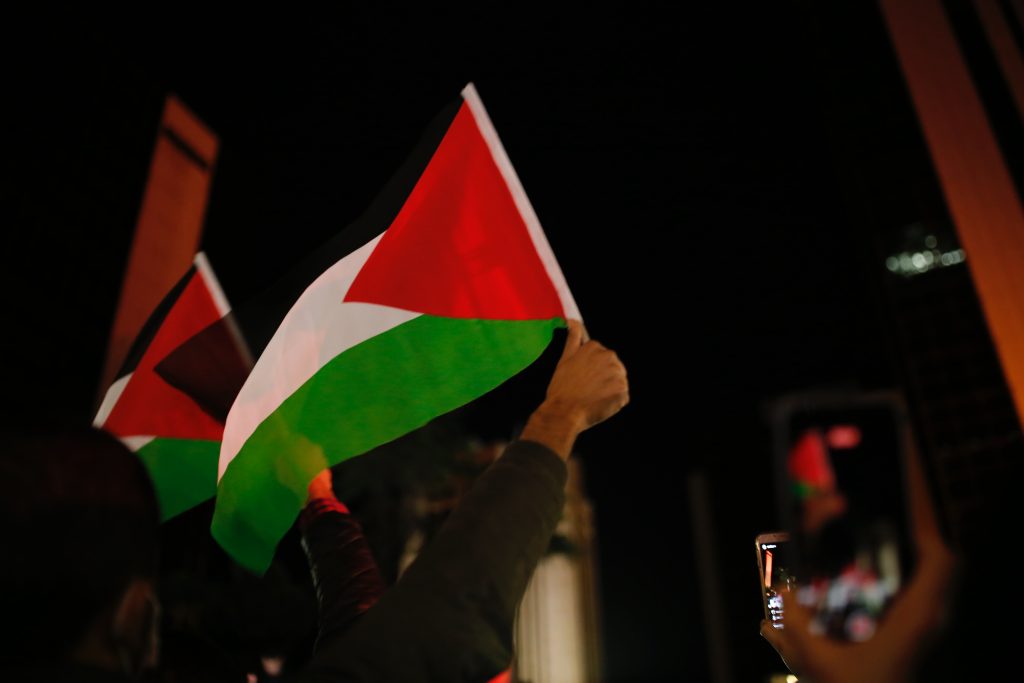from 1914 to 1949
by Carolina Veloso and Inês Poças

1516 – World War I (1914 – 1918)
Palestine was a part of the Ottoman Empire, having developed their own Palestinian identity.
During WWI, there was a growing Arab political movement to gain independence from the Ottoman Empire.
1916
Sir Arthur Henry McMahon, a British diplomat, and The Sherif Hussein of Mecca, an Arab leader, agreed that the British would recognise an independent Arab State, as an exchange for the help the Arabs gave Britain during WWI, against the Otoman Empire.
1917
Despite this agreement, Britain issued the Balfour Declaration, promising the Palestinian land to Zionists to form their “holy land”, the Jewish state. Palestine’s majority Arab population was referred to as non-Jewish communities, who would be given civil and religious, but did not guaranteed political and national rights.
1922
Given the losses suffered by the Ottaman Empire after WWI, Great Britain gained control of Palestine, creating the British Mandate of Palestine.
1922-1931
The Jewish population in Palestine increased, the rise of Hitler and the Nazi Party made Palestine see the biggest wave of Jewish emigration yet.
1936-1939
Palestinians rebelled against both British colonial forces and Jewish settlers, but were brutally crushed.
1939-1947
To prevent further resistance, the British began to limit Jewish immigration. This made Zionist extremists angry, leading to more violence.
1945
The Arab League was created in response to the growing of Jews in Palestine. It was formerly composed by Egypt, Syria, Saudi Arabia, Jordan and Iraq
1947
After decades of trying to keep their control over Palestine and interfering in the region, the British left the feuds and violence in Palestine to be resolved by the recently formed United Nations.
The UN proposed “The Palestinian Plan of 1947” that sought to divide Palestine into an Arab State and a Jewish State, with Jerusalem as a separate UN-controlled entity.
April 1948
Zionist group Haganah proposed the Plan Dalet, seeking to “defend its borders” by invading the Palestinian villages and homes, and expelling them from their land. In reality, the majority of the operations took place outside of the UN’s proposed Jewish state. The plan called for the destruction of Arab villages by setting fire to, blowing up, and planting mines. In case of resistance, it called for the population to be expelled outside of the borders of the state, villages emptied, and for the occupation and control of Arab villages along main transportation arteries.
Massacre of Deir Yassin, April 9th, 1948
Zionists massacred the entire village of Deir Yassin “to serve as a warning” to Palestianians, even though the village had made a local peace pact with neighboring Jewish settlements.
After Deir Yassin, Zionist paramilitary groups took major cities, including Haifa and Jaffa, along with hundreds of smaller villages and towns. Hundreds of thousands of Palestinians were forced to flee, pouring into neighboring states as refugees, but keeping their house keys in their pocket, hoping to return. However, Zionist paramilitary destroyed villages, preventing Palestinians from returning home.
Al Nakba
It is believed that the events of 1948 initiated what Palestinians refer as the Al Nakba, meaning “The Catastrophe”. It refers to the mass exodus of 750 thousand Palestinians, the estimated 15 thousand Palestinian killed and the destruction of more than 500 villages.
May 14th, 1948
Israel declared its independence and was recognized by the two world’s great powers, United States and Soviet Union.
May 15th, 1948
The Arab League declared war on Israel, but would end up losing it.
Israel takes this as an opportunity to occupy more territories than the ones which they were given by the UN. Although the UN has called for a devolution of these territories, that has never happened.
“The Palestinian people have been subjected to 56 years of suffocating occupation. They have seen their land steadily devoured by settlements and plagued by violence; their economy stifled; their people displaced; and their homes demolished. Their hopes for a political solution to their plight have been vanishing.”
António Guterres, UN’s Secretary General
References
- https://www.un.org/unispal/history/
- https://www.palestine-studies.org/en/node/1650358
- https://youtu.be/rGVgjS98OsU?si=rEXfBxSjxD1LI6eU
- https://youtu.be/iRYZjOuUnlU?si=xhuHbLbl0dv05m6y
- https://www.britannica.com/event/Balfour-Declaration
- https://www.jstor.org/stable/2193961
- https://www.britannica.com/place/Deir-Yassin
- https://www.jstor.org/stable/24450239
- https://www.jstor.org/stable/2537591
- https://www.google.com/amp/s/www.aljazeera.com/amp/features/2017/5/23/the-nakba-did-not-start-or-end-in-1948